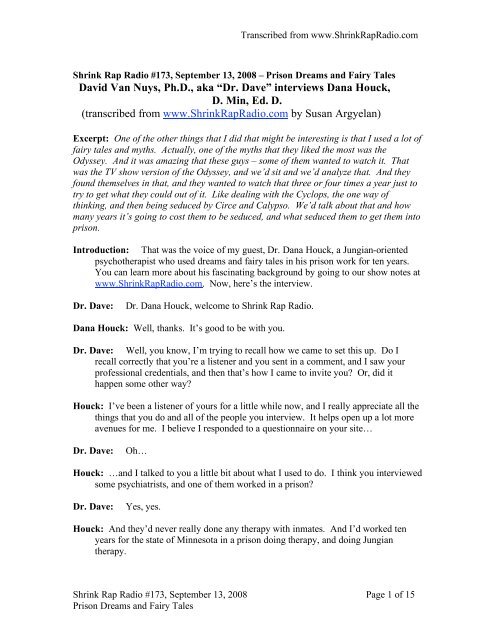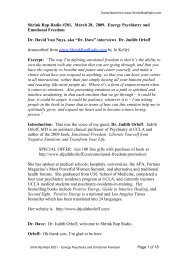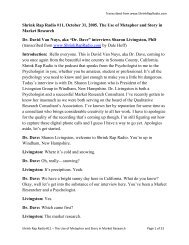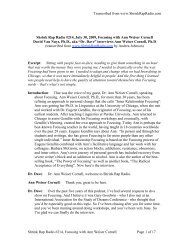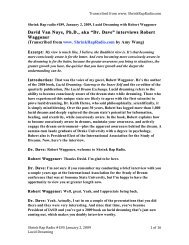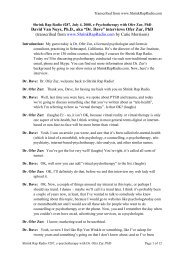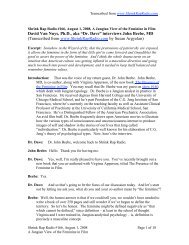with Dr. Dana Houck - Shrink Rap Radio
with Dr. Dana Houck - Shrink Rap Radio
with Dr. Dana Houck - Shrink Rap Radio
Create successful ePaper yourself
Turn your PDF publications into a flip-book with our unique Google optimized e-Paper software.
Transcribed from www.<strong>Shrink</strong><strong>Rap</strong><strong>Radio</strong>.com<br />
<strong>Shrink</strong> <strong>Rap</strong> <strong>Radio</strong> #173, September 13, 2008 – Prison <strong>Dr</strong>eams and Fairy Tales<br />
David Van Nuys, Ph.D., aka “<strong>Dr</strong>. Dave” interviews <strong>Dana</strong> <strong>Houck</strong>,<br />
D. Min, Ed. D.<br />
(transcribed from www.<strong>Shrink</strong><strong>Rap</strong><strong>Radio</strong>.com by Susan Argyelan)<br />
Excerpt: One of the other things that I did that might be interesting is that I used a lot of<br />
fairy tales and myths. Actually, one of the myths that they liked the most was the<br />
Odyssey. And it was amazing that these guys – some of them wanted to watch it. That<br />
was the TV show version of the Odyssey, and we’d sit and we’d analyze that. And they<br />
found themselves in that, and they wanted to watch that three or four times a year just to<br />
try to get what they could out of it. Like dealing <strong>with</strong> the Cyclops, the one way of<br />
thinking, and then being seduced by Circe and Calypso. We’d talk about that and how<br />
many years it’s going to cost them to be seduced, and what seduced them to get them into<br />
prison.<br />
Introduction: That was the voice of my guest, <strong>Dr</strong>. <strong>Dana</strong> <strong>Houck</strong>, a Jungian-oriented<br />
psychotherapist who used dreams and fairy tales in his prison work for ten years.<br />
You can learn more about his fascinating background by going to our show notes at<br />
www.<strong>Shrink</strong><strong>Rap</strong><strong>Radio</strong>.com. Now, here’s the interview.<br />
<strong>Dr</strong>. Dave:<br />
<strong>Dr</strong>. <strong>Dana</strong> <strong>Houck</strong>, welcome to <strong>Shrink</strong> <strong>Rap</strong> <strong>Radio</strong>.<br />
<strong>Dana</strong> <strong>Houck</strong>: Well, thanks. It’s good to be <strong>with</strong> you.<br />
<strong>Dr</strong>. Dave: Well, you know, I’m trying to recall how we came to set this up. Do I<br />
recall correctly that you’re a listener and you sent in a comment, and I saw your<br />
professional credentials, and then that’s how I came to invite you? Or, did it<br />
happen some other way?<br />
<strong>Houck</strong>: I’ve been a listener of yours for a little while now, and I really appreciate all the<br />
things that you do and all of the people you interview. It helps open up a lot more<br />
avenues for me. I believe I responded to a questionnaire on your site…<br />
<strong>Dr</strong>. Dave:<br />
Oh…<br />
<strong>Houck</strong>: …and I talked to you a little bit about what I used to do. I think you interviewed<br />
some psychiatrists, and one of them worked in a prison?<br />
<strong>Dr</strong>. Dave:<br />
Yes, yes.<br />
<strong>Houck</strong>: And they’d never really done any therapy <strong>with</strong> inmates. And I’d worked ten<br />
years for the state of Minnesota in a prison doing therapy, and doing Jungian<br />
therapy.<br />
<strong>Shrink</strong> <strong>Rap</strong> <strong>Radio</strong> #173, September 13, 2008 Page 1 of 15<br />
Prison <strong>Dr</strong>eams and Fairy Tales
Transcribed from www.<strong>Shrink</strong><strong>Rap</strong><strong>Radio</strong>.com<br />
<strong>Dr</strong>. Dave: Yes. Now I do remember that you turned in a survey, and I was reading<br />
through the surveys. ‘Cause I was looking back through the e-mails, and I was<br />
saying, “Now, did I get an e-mail from him telling me about his work?” And now it<br />
comes back to me that it was through your survey answer. And I saw that, and I<br />
realized that you would make a good guest. So, you sort of started to go there, but<br />
let me have you start out by telling us a bit about your background.<br />
<strong>Houck</strong>: I had been in the prison for a little over ten years. Before that, I worked as a<br />
psychologist in the State Developmental Center in South Dakota, and before that, I<br />
worked in Sioux Falls, South Dakota and came to Minnesota ten years ago.<br />
<strong>Dr</strong>. Dave:<br />
Well, I was hoping to have you go back even further than that. (laughs)<br />
<strong>Houck</strong>: (laughs) Okay.<br />
<strong>Dr</strong>. Dave: You describe yourself both as a minister and as a Jungian therapist. Which<br />
came first?<br />
<strong>Houck</strong>: Actually, I was a minister in the United Methodist Church. I went to seminary a<br />
long time ago, I got a Master’s in Divinity and a Doctor of Ministry and actually<br />
still do serve a small church right now on weekends.<br />
<strong>Dr</strong>. Dave:<br />
Mm-hmm…<br />
<strong>Houck</strong>: And from there, it just seemed that it wasn’t quite satisfying enough, and I<br />
actually had dreams that seemed to indicate I did need to know more, so I went<br />
back to school and got my Master’s and Doctorate in Psychology and Counseling.<br />
<strong>Dr</strong>. Dave: Okay. Well, that’s an interesting story. And then somehow, you got<br />
involved <strong>with</strong> the work of Carl Jung. How did that come to happen?<br />
<strong>Houck</strong>: That was just some personal things when I was doing some work, just doing<br />
some internal struggling about looking for more purpose in life, looking for some<br />
deeper meaning. And, I ran into a Jungian analyst – a therapist – and from there, I<br />
guess it’s history. I enjoyed it; I learned a lot about a lot of things and about<br />
myself, and a lot about people. I guess I really enjoyed the depth psychology,<br />
moving down deep into what made me tick…<br />
<strong>Dr</strong>. Dave:<br />
Yes.<br />
<strong>Houck</strong>: …and what was going on inside of me and what the call was.<br />
<strong>Dr</strong>. Dave: It sounds like the search for meaning was a central thread for you in your<br />
life for some time, first drawing you into the ministry and then later (inaudible)<br />
psychology.<br />
<strong>Shrink</strong> <strong>Rap</strong> <strong>Radio</strong> #173, September 13, 2008 Page 2 of 15<br />
Prison <strong>Dr</strong>eams and Fairy Tales
Transcribed from www.<strong>Shrink</strong><strong>Rap</strong><strong>Radio</strong>.com<br />
<strong>Houck</strong>: Yeah. I think a lot of that came from some personal issues when I was young.<br />
My father died when I was young, and I guess I was looking for some answers as to<br />
why that would be, and what that meant for me.<br />
<strong>Dr</strong>. Dave:<br />
Mm-hmm…<br />
<strong>Houck</strong>: And so, that’s how I began to look for the answers to those questions, and that<br />
led me down this road.<br />
<strong>Dr</strong>. Dave: Yes, yes. Now, one of the things that I was struck by and that we’ll be<br />
talking about, I hope, is your use of dream work in prison. And, it made me wonder<br />
if you’re familiar <strong>with</strong> the work of Jeremy Taylor, who’s a Unitarian minister who<br />
defines his ministry as dream work, in fact.<br />
<strong>Houck</strong>: No, I’m not. That sounds interesting.<br />
<strong>Dr</strong>. Dave: Yeah. Let me recommend him to you. He’s written several books, and I<br />
think the first one that he wrote, which still leaves a strong imprint in my mind – I<br />
think the title actually is <strong>Dr</strong>eam Work, if I remember correctly. Jeremy Taylor. I<br />
actually… You should look back in the archives for the show, because I<br />
interviewed him. Very dynamic guy. Also, very much influenced by Jung’s work,<br />
and also somebody who’s done some dream work in prison settings, so I think<br />
you’d be really fascinated in his writing.<br />
<strong>Houck</strong>: Yes, sounds like it.<br />
<strong>Dr</strong>. Dave: Plus, he does workshops all over the country. He might be in your area at<br />
some point. Okay, so you spent ten years working in a prison. How did you come<br />
to do that in the first place?<br />
<strong>Houck</strong>: I was working in South Dakota and actually had a series of dreams that said I<br />
needed to move on to something different. And so I applied to the prison, and it<br />
just kind of got lost for a few months. And then I got a call that basically said,<br />
“Come on over. We have an opening; we’d like to have you come over.” So, I<br />
answered the call and I interviewed at the prison, and everything just fell into place.<br />
I was looking for a challenge, and I got it, so…<br />
<strong>Dr</strong>. Dave: Yeah. I was going to say, didn’t you have any apprehensions about going<br />
to work in a prison? (laughs) I know I would.<br />
<strong>Houck</strong>: (laughs) To be honest <strong>with</strong> you, when I first started, I did. I remember the first<br />
day I walked in to go to work, after the interview, and they shut the sally-port doors.<br />
And I went, oh, my! What did I get into? ‘Cause you hear those doors clang<br />
behind you, and you know that there’s a… If all the quote, all the “bad guys” are<br />
on the inside, what am I doing in here?<br />
<strong>Shrink</strong> <strong>Rap</strong> <strong>Radio</strong> #173, September 13, 2008 Page 3 of 15<br />
Prison <strong>Dr</strong>eams and Fairy Tales
Transcribed from www.<strong>Shrink</strong><strong>Rap</strong><strong>Radio</strong>.com<br />
<strong>Dr</strong>. Dave:<br />
Yeah.<br />
<strong>Houck</strong>: So, there was some apprehension just because I’d probably believed all the<br />
movies and all the hype of Hollywood, but actually it wasn’t that bad. But to be<br />
honest <strong>with</strong> you, I was a little bit nervous about doing it.<br />
<strong>Dr</strong>. Dave: And then, as you got to be there for some period of – well, for ten years –<br />
did you ever fear for your physical safety? Were there ever incidents where you felt<br />
physically threatened?<br />
<strong>Houck</strong>: Actually, no, I didn’t. I was, I was kind of surprised as I thought back about my<br />
ten years. I never was threatened. I think…<br />
<strong>Dr</strong>. Dave:<br />
Are you a big guy <strong>with</strong> lots of tattoos?<br />
<strong>Houck</strong>: (laughs) No, but I can get ‘em cheap!<br />
<strong>Dr</strong>. Dave:<br />
(laughs)<br />
<strong>Houck</strong>: (laughs) Actually, I’m not that big a guy. One of the things I found, though –<br />
that if you’re fair and treat everybody equal, they kind of respect that. It’s when<br />
you become kind of a jerk and use any type of power that you may have that they<br />
get a little bit riled. And then the games are on.<br />
<strong>Dr</strong>. Dave:<br />
Mm-hmm…<br />
<strong>Houck</strong>: But, as long as I was honest <strong>with</strong> them and upfront <strong>with</strong> them and fair and<br />
consistent, they… I had no problem at all.<br />
<strong>Dr</strong>. Dave: Well, that’s great. You know, one of the impressions that I have – and by<br />
the way, I know you’ve got some podcasts on your website – and I listened a bit<br />
and found it to be very informative. I’m interested in the whole idea that prison can<br />
be sort of a university for learning to be a better criminal.<br />
<strong>Houck</strong>: Yeah. There, since you have all these people – there were 1,100 inmates in the<br />
prison that I was working at – they get, I mean they’re all packed together pretty<br />
tight, and they can sit and talk to each other about how to make meth, where to find<br />
it, where to get the best weed. And they also make a lot better connections. If they<br />
have dealers that are still on the inside and they have all their friends still on the<br />
outside – it depends on who gets in or out first – you learn a lot. I learned a lot<br />
about different things, about where to go and the best street corners – and this, just<br />
listening and overhearing people talk.<br />
<strong>Dr</strong>. Dave: Yeah. Now, you got really fed up <strong>with</strong> the bureaucracy in the prison<br />
system. Tell us about that.<br />
<strong>Shrink</strong> <strong>Rap</strong> <strong>Radio</strong> #173, September 13, 2008 Page 4 of 15<br />
Prison <strong>Dr</strong>eams and Fairy Tales
Transcribed from www.<strong>Shrink</strong><strong>Rap</strong><strong>Radio</strong>.com<br />
<strong>Houck</strong>: Because of when I left the prison, it was not a good thing. It was nasty in there.<br />
Actually, the hardest part was dealing <strong>with</strong> the administration.<br />
<strong>Dr</strong>. Dave:<br />
They were worse than the so-called criminals, it sounds like.<br />
<strong>Houck</strong>: Actually, they were. They really were.<br />
<strong>Dr</strong>. Dave:<br />
Yeah.<br />
<strong>Houck</strong>: It was, I mean to be honest, point-blank, it was like working for the Nazis. They<br />
monitored everything. I mean, they’d monitor, they could take over the computer,<br />
they monitored it, and they monitored your time and how much you were gone for<br />
lunch – they’d get it down to the second, almost. So, Big Brother was watching.<br />
Actually, it seemed like they only wanted one form of psychology, and it was<br />
basically cognitive psychology. And I had been doing this for oh, about seven<br />
years, when they said, “No, you can’t do that anymore.” And actually, I did a quick<br />
analysis of the groups that I ran. I ran, at one point, I was running about six<br />
different groups and had a couple hundred people. And they had been released, and<br />
then I did a quick analysis of how long they’d been out and how long they were in<br />
the group, and found that if they’d been in the group for six months, basically, they<br />
had a 3% chance of coming back to prison. But, the one day, I was told…<br />
<strong>Dr</strong>. Dave:<br />
And how does that compare to the normal recidivism rate?<br />
<strong>Houck</strong>: The normal rate’s around 40%.<br />
<strong>Dr</strong>. Dave:<br />
So, in other words, this was dramatically effective.<br />
<strong>Houck</strong>: Right. But I was told I couldn't do it anymore because it was the wrong theory<br />
of psychology.<br />
<strong>Dr</strong>. Dave:<br />
And, what was the “it” that you were doing that was not…?<br />
<strong>Houck</strong>: Actually, dream analysis. I was told I was never to interpret a dream while I<br />
was in there again.<br />
<strong>Dr</strong>. Dave:<br />
Wow.<br />
<strong>Houck</strong>: So, basically, I ended up doing things kind of in a covert way. When I was<br />
crossing the yard or walking across the yard, some of the people that I’d worked<br />
<strong>with</strong> would come up, and we’d cross the yard and talk about dreams and some of<br />
the other issues that they were having.<br />
<strong>Dr</strong>. Dave: Well, let’s talk about the dream work. What was your approach to it, how<br />
did prisoners take to it, and so on?<br />
<strong>Shrink</strong> <strong>Rap</strong> <strong>Radio</strong> #173, September 13, 2008 Page 5 of 15<br />
Prison <strong>Dr</strong>eams and Fairy Tales
Transcribed from www.<strong>Shrink</strong><strong>Rap</strong><strong>Radio</strong>.com<br />
<strong>Houck</strong>: What I did was, we had a, I had a group of individuals – I did some individual<br />
therapy as well. But most of it happened in a group setting <strong>with</strong> about 10-12<br />
inmates in a circle. And they’d come in, and we’d talk a little bit, and they’d share<br />
some dreams, and we’d just kind of talk to them about what some of the directions<br />
that the dreams were taking…and what the dreams are trying to get them to<br />
understand about life and about, sometimes about their crimes – some things that<br />
they hadn’t really looked into yet. Basically, I was just trying to understand how<br />
they got stuck and what brought them into prison – because there’s actually a pretty<br />
interesting, lot of different reasons why these guys ended up in prison. Sometimes<br />
they came into prison to get out of the situation they were in. I remember having<br />
one individual who was, his dad was a big farmer. And he was in line to inherit this<br />
great big farm, but the problem was, he didn’t really want to be a farmer. And so he<br />
would often go out and get drunk, and then one night he was drunk and he took a<br />
gun over to his neighbors’ house, that were good friends <strong>with</strong> his mom and dad, and<br />
began to shoot the gun up in the air, not shooting at anybody. But because he was<br />
discharging a firearm, he got a year and a day and came to prison – disgraced his<br />
family, basically, and that was his way out of not being on the farm anymore. He<br />
wanted to be a graphic artist, and so after he got out of prison, he went into graphic<br />
art. But he didn’t know how else to get out of the condition that he was in, so he<br />
did something not quite right and ended up in prison to get out. And his dreams –<br />
we talked – his dreams began to point to that kind of thing, that he was not where he<br />
was supposed to be and that he needed to stand up and go his own direction.<br />
<strong>Dr</strong>. Dave: Well, that’s a great story, and I want you to feel free to throw in any other<br />
stories that come to mind. Now, did the other prisoners get engaged in this process<br />
of (inaudible) this person’s dream? Did they have ideas and kind of chip in <strong>with</strong><br />
their own impressions of what the dream might be saying?<br />
<strong>Houck</strong>: Yeah, we… I would open it up, because the thing that we noticed – that I<br />
noticed, especially – is that when someone would share a dream, a lot of these other<br />
guys could begin to relate to pieces of it. And so, while it was that one individual’s<br />
dream, it became part of everybody’s dream, and they began to throw ideas, or<br />
sometimes they would challenge each other about what they were saying. They<br />
knew each other from being on the inside and dealing <strong>with</strong> each other day and<br />
night, and so they’d often keep each other honest, which was kind of fascinating.<br />
What happened in the group is that the group actually became more of a community<br />
once they got in it and they were working <strong>with</strong> each other, and they would actually<br />
look out for each other on the yard – make sure that they were being honest,<br />
sometimes make sure that they were being taken care of. Because we’d get, often,<br />
we’d get gang leaders in the group and we’d get people that were just trying to do<br />
their time and get through. And, there’s all kinds of games that are going on in<br />
prison, anyway. So, some of these guys would actually protect other members of<br />
the group just because they knew what they were about. They knew they were<br />
trying to be upfront and honest and trying to better themselves, or develop<br />
themselves. So, it really became kind of fascinating to watch. And then, they<br />
would bring these stories in to the group as well, so that the dreams of one<br />
<strong>Shrink</strong> <strong>Rap</strong> <strong>Radio</strong> #173, September 13, 2008 Page 6 of 15<br />
Prison <strong>Dr</strong>eams and Fairy Tales
Transcribed from www.<strong>Shrink</strong><strong>Rap</strong><strong>Radio</strong>.com<br />
individual became sometimes the dreams of all the different men in the group.<br />
They used bits and pieces of it. And, the best part is, they began to see themselves<br />
in some of that, in the dream, in some of the discussion. I had a… One day, we<br />
had a group of college students come into the, and talk to some of the inmates I was<br />
working <strong>with</strong>. And, I didn’t realize it, but I picked four people that had been in, that<br />
were in for murder, and one drug dealer. And the drug dealer was listening to these<br />
other guys talk about their story, and then somebody asked him about his life. And<br />
he just kind of looked at him, said, “I just had a really interesting realization<br />
that…well, all these guys murdered somebody. They killed him very quickly. I<br />
just, <strong>with</strong> the drugs I sold, I just killed people slowly. So, I’m no different than they<br />
were.”<br />
<strong>Dr</strong>. Dave:<br />
Wow. What an insight.<br />
<strong>Houck</strong>: Yeah, and it kind of shocked, it shocked everybody in the room, and it shocked<br />
me that he came to that.<br />
<strong>Dr</strong>. Dave:<br />
Yes.<br />
<strong>Houck</strong>: So, it’s a…there were lots of… And, the use of dreams, actually helped some of<br />
these guys move beyond where they were. A lot of these guys had been in<br />
detention centers – juvenile detention centers – since they were 14, 16 years old,<br />
and they’d been dealing <strong>with</strong> various psychologists. And, one of the interesting<br />
things that happened is that they’d learned the language and the jargon very well.<br />
And, so they’d come up <strong>with</strong> what they thought was the right answer just to get me<br />
off their backs sometimes. And, I would push, because the dream would say<br />
they’re not really dealing <strong>with</strong> it. So, what I would often say was, “You’re not<br />
giving me the – you’re giving me the right answer, but you’re not giving me the real<br />
answer.” And, that would frustrate them because they’d say, “Well, this basically<br />
got me through all these other years, so what are you looking for?” And, what I<br />
was looking for was something from deep inside, near the heart, and just from their<br />
head (?). And, once they understood that, they could spot that in other people as<br />
well, when they began just to give the “right answer,” as I called it, and not<br />
something that was going to help them grow and develop.<br />
<strong>Dr</strong>. Dave: That’s great. That’s great. What do you think it is about dreams that leads<br />
to that kind of group cohesion that you were talking about?<br />
<strong>Houck</strong>: I think that it’s becoming real, and that what’s being presented is very real.<br />
And, a lot of these guys are really looking for that reality that is more than what<br />
they had been given. Because, again, their soul is actually asking for help, and…<br />
Because sometimes, I would get very, pretty harsh <strong>with</strong> some of these guys and<br />
really confrontative, and then that’s when you asked if I’d ever been threatened, as<br />
confrontative as I often got, I was never threatened. Actually, what I felt is that if I<br />
would be pushing somebody – and I usually knew when to stop – but if I’d push, if<br />
they really got upset, I knew that the other people in the group, the other inmates,<br />
<strong>Shrink</strong> <strong>Rap</strong> <strong>Radio</strong> #173, September 13, 2008 Page 7 of 15<br />
Prison <strong>Dr</strong>eams and Fairy Tales
Transcribed from www.<strong>Shrink</strong><strong>Rap</strong><strong>Radio</strong>.com<br />
would probably jump up and make sure that nothing happened to me; at least that’s<br />
what I was hoping.<br />
<strong>Dr</strong>. Dave:<br />
(laughs) Yeah. Right.<br />
<strong>Houck</strong>: It felt that way.<br />
<strong>Dr</strong>. Dave:<br />
Yes.<br />
<strong>Houck</strong>: But, they were looking for some truth, and the dreams basically told them the<br />
truth. And beginning to unravel the truth of the dream, they understood, and they<br />
knew that all I was doing was giving them what they really needed to hear, instead<br />
of some other jargon, or some other nice, quick, cute little answer. They were<br />
hearing something deep – and deep from inside of them – and that’s what they<br />
really wanted and they really liked. Often, I would get the comments that, “This is<br />
the first time anybody’s ever really told me the truth.”<br />
<strong>Dr</strong>. Dave:<br />
Well, that must’ve been very gratifying.<br />
<strong>Houck</strong>: Yeah, actually, it really was. It was quite moving.<br />
<strong>Dr</strong>. Dave: Yeah. Well, you know I’m really on the same page <strong>with</strong> you in terms of<br />
believing that dreams speak a kind of universal language. We all dream, we all<br />
dream every night… And, it’s funny, at the same time, that dreams seem to be so<br />
mysterious and so confusing at times. But there’s another way in which they really<br />
do lay bare the primary emotional issues, and those emotions are so universal that<br />
we can really recognize them and relate to them and one another.<br />
<strong>Houck</strong>: Yeah… And I found they really wanted to get to that emotion, as tough as these<br />
guys sometimes pretended they were. It was amazing what would happen when the<br />
emotion would come out, and they really appreciated that. One of the interesting<br />
things that I started doing toward the end when I was there was, the dreams began<br />
to point to… at least for some of them that had been in the group for a while, about<br />
issues concerning restorative justice. And I had an individual who had one dream –<br />
he was an artist; he was really a very good artist – and the dreams began to say, “All<br />
right. Now it’s time for you to try to restore and bring yourself back to wholeness,<br />
but also return something back to the community.” And he had a dream that was<br />
basically said that… He was in for murder, and his wife was… He murdered his<br />
ex-wife, who was also pregnant at the time. And the dream basically said,<br />
“Because of your crime, what you’re going to have to do is you’re going to have to<br />
paint. But what you need to paint are pictures of children who have died, and of the<br />
other inmates that are in the group.” And one inmate happened to have a, his<br />
daughter was killed in a car accident while he was in prison, and he had a picture of<br />
the daughter. And this inmate had to paint a picture – a portrait – of this daughter.<br />
And as he tried to do it, he said it just ripped his guts out. Because he had to look at<br />
the picture and realize what he’d done, but also try to capture the essence of this<br />
<strong>Shrink</strong> <strong>Rap</strong> <strong>Radio</strong> #173, September 13, 2008 Page 8 of 15<br />
Prison <strong>Dr</strong>eams and Fairy Tales
Transcribed from www.<strong>Shrink</strong><strong>Rap</strong><strong>Radio</strong>.com<br />
little girl. And it took him months to do it. We’d talk often about how difficult it<br />
was; he didn’t think he could do it. And I just kept telling him he had to do it, and<br />
finally, one day he finished it. He brought it in, and it was quite a big portrait. And<br />
he showed it to everybody. In the portrait’s eyes, you could just see that he caught<br />
the essence of her soul. And he passed it around, and everybody looked at it, and I<br />
had to pass a Kleenex box around behind the picture, because it moved everybody<br />
that much. And it was really interesting to see that kind of emotion coming out.<br />
<strong>Dr</strong>. Dave: Wow. You know, I think a lot of times when we hear about somebody who<br />
has murdered his pregnant wife, a lot of people would have the reaction, “Well, this<br />
person is a monster; this person’s beyond the… is somehow really different from<br />
other people.”<br />
<strong>Houck</strong>: In a fit of passion, I don’t know if anybody’s that much different. And that’s<br />
what I came to learn, is that some of these guys are pretty wicked people, but if they<br />
get the chance to begin to look inside themselves, they begin to confront that<br />
monster or that wickedness and begin to work <strong>with</strong> it. That’s kind of what most of<br />
them really wanted to do, because they got tired of that lifestyle. They could see<br />
that it wasn’t going anywhere. As a lot of them would say, “Being a drug dealer,<br />
the retirement system’s not that good.” So, they’d look at their lives and say, “I<br />
have absolutely nothing anymore,” which was a good place to start. But a lot of<br />
these guys were pretty wicked at times. Some scared me, but you learn to deal <strong>with</strong><br />
it.<br />
<strong>Dr</strong>. Dave: Well, you know, that raises an interesting philosophical question that I –<br />
philosophical, psychological – I’d be interested in your take on it. Because you’ve<br />
got one foot in the world of theology and another foot in the world of psychology,<br />
and often, psychology is accused of kind of letting people off the moral hook, you<br />
know – that everything can be reduced to problems of childhood or brain chemistry<br />
or something like that. So, on the one hand, you have those sorts of naturalistic<br />
explanations that account for things, and some people feel like, well, that could be<br />
used as an excuse. On the other hand, you have this viewpoint of sin or<br />
wickedness, kind of an absolute judgment. Can you say anything about that<br />
dichotomy?<br />
<strong>Houck</strong>: Yeah. As I worked <strong>with</strong> the inmates, the statement, “There by the grace of God<br />
go I.” The only difference between a lot of those guys and other people on the<br />
outside is they got caught. For some of the crimes, some of them, what they did<br />
was vicious. I mean, some of the stories that I could tell you would – I mean, they<br />
curled my toes when I heard them and often made me very angry. But again, this<br />
part of the human condition that there’s that shadow side, and if they are not aware<br />
of it, they’ll act it out or do something that’s going to hurt people big-time, or<br />
destroy people. So, what I would do was simply say, “Okay. This is the way your<br />
life has been; this is how it got up to this point. Well, we could look into it, but<br />
what we need to do is find out what you’re supposed to be doing.” And, often, the<br />
reason they committed the crime was to avoid what life was actually trying to get<br />
<strong>Shrink</strong> <strong>Rap</strong> <strong>Radio</strong> #173, September 13, 2008 Page 9 of 15<br />
Prison <strong>Dr</strong>eams and Fairy Tales
Transcribed from www.<strong>Shrink</strong><strong>Rap</strong><strong>Radio</strong>.com<br />
them to do and trying to get them to be. So, even though they committed a terrible,<br />
terrible crime, the point is, is what can my life, what can their life become? And<br />
how do they begin to restore what they’ve taken? How do they give back what they<br />
have taken? So, the idea of theology and psychology actually, I thought, worked<br />
really well, because I wouldn’t let them off the hook. They would have to go into<br />
the crime and understand why they committed it, and then I would have to figure<br />
out what am I going to do <strong>with</strong> it. I had an individual that he, basically, he<br />
projected his soul onto a woman that didn’t even know him, and he was stalking her<br />
for a little bit. And one night, he was standing outside her house when the<br />
boyfriend said goodbye to this girl that he fell in love <strong>with</strong>. And he followed the<br />
man to his house, and then basically beat him up <strong>with</strong> a baseball bat and left him in<br />
the yard to die and went across the street and watched the guy kind of struggle, and<br />
went back and beat him again and was going to pour some gasoline – I think he<br />
actually did pour some gasoline on him but thought better of lighting it. That’s kind<br />
of a wicked thing to do, but he began to understand what had happened and what he<br />
was doing by projecting his soul onto the woman, and how he felt that she couldn’t<br />
be <strong>with</strong> anybody, and he was going to take anybody that got in his way, out. And<br />
once he began to look at that and understand that that was happening, and he<br />
needed to pull that projection back into himself, it changed his life. He relaxed and<br />
began to understand that there was another way to live life then and own his own<br />
life, rather than trying to give it to somebody else.<br />
<strong>Dr</strong>. Dave: What an interesting way to talk about stalking as “projecting his soul” onto<br />
the woman. Just in case there’s anybody who doesn’t understand what you’re<br />
saying there, just say a little bit more about what you mean by “he was projecting<br />
his soul” onto this woman that he was stalking.<br />
<strong>Houck</strong>: Well, for me, in this case he was basically giving her all his feminine emotions,<br />
his feminine psyche, so that he wouldn’t have to carry it. So, if he could give it to<br />
her, then he wouldn’t have to deal <strong>with</strong> any of those personal things himself. That<br />
actually happened a lot for a lot of these guys in prison – whether they killed<br />
anybody or not – is that they projected those kinds of things onto a woman, and<br />
that’s why they always felt like they had to have a woman nearby, so that they<br />
didn’t have to carry. And they would often say that, “I would ask her, what do I<br />
feel? And what should I say at this point? Because I don’t know what to do.” So,<br />
they gave to the female that they were <strong>with</strong>, everything that they needed to<br />
understand about themselves. That’s what I call “soul projection,” is (I) gave<br />
somebody else what I’m supposed to be feeling.<br />
<strong>Dr</strong>. Dave: Mm-hmm… I’m curious whether or not… You know, self-disclosure is<br />
always such a delicate issue in psychotherapeutic situations, and I’m just wondering<br />
if you ever shared one of your dreams <strong>with</strong> a group.<br />
<strong>Houck</strong>: Actually, I didn’t. Self-disclosure is really frowned on in a prison. You don’t<br />
want to give these guys too much information. I would tell them a little bit about<br />
my background, but I usually never told them a dream that I had. I mean, I would<br />
<strong>Shrink</strong> <strong>Rap</strong> <strong>Radio</strong> #173, September 13, 2008 Page 10 of 15<br />
Prison <strong>Dr</strong>eams and Fairy Tales
Transcribed from www.<strong>Shrink</strong><strong>Rap</strong><strong>Radio</strong>.com<br />
tell them some of the childhood stories that I would have – just a few of them, but<br />
you have to be really careful.<br />
<strong>Dr</strong>. Dave: I can see that, particularly in that setting – that that could be a risky thing to<br />
do. What size group are we talking about? Typically, how many people would you<br />
have in your group?<br />
<strong>Houck</strong>: I’d usually have 10-12 in a group.<br />
<strong>Dr</strong>. Dave:<br />
That’s a good size, yeah.<br />
<strong>Houck</strong>: Yeah. Actually, and the interesting thing is, is that when I was doing, in the<br />
heyday of when I could do the groups, I did 4-6 groups a week and I had a waiting<br />
list of guys that were trying to get in. And this was all voluntary, and if they<br />
dropped out, there wasn’t any penalty, but they all wanted…a lot of guys were<br />
trying to get in.<br />
<strong>Dr</strong>. Dave: Were there any sort of benefits that they would get? I mean, would they get<br />
out of doing some work, or was there any external motivation that would’ve caused<br />
that to happen?<br />
<strong>Houck</strong>: None. None at all. In fact, if they came to the group – and this is a, they call it a<br />
working prison, where they had a job – they would lose pay for coming to the<br />
group. But one individual – when I left, I was still somewhat doing the group kind<br />
of covertly – but he basically said, “If you had this thing at 2:00 in the morning,<br />
we’d all be here,” because they felt that they were suddenly being heard, and they<br />
were changing in ways that they felt were really positive for themselves. So, yeah,<br />
it was fun, and usually I had about 10 people that would do it.<br />
<strong>Dr</strong>. Dave: If you could magically be made “czar” of the criminal justice system, how<br />
would you change the prison system?<br />
<strong>Houck</strong>: I guess I would try to make it a little less like being in a military setting. A lot<br />
of these, some of these people that committed the crime are just one-timers, and<br />
some of them are career. But, what I would try to do is try to develop more of<br />
community – develop little groups <strong>with</strong>in the prison, where they would, kind of like<br />
a therapeutic community <strong>with</strong>in the prison. I found again, when I did the groups, I<br />
found that a lot of them wanted that kind of community. They didn’t know how to<br />
be in community, how to actually have empathy for each other. And I think being in<br />
that kind of setting and looking out for each other actually helped that kind of<br />
process. Of course, I’m looking at it from a therapeutic point of view. But I’d also<br />
have some of the staff and some of the guards understand some of the processes that<br />
are going on instead of simply saying, having the power struggles between inmates<br />
and staff. Some of that’s necessary, but kind of understanding what’s going on <strong>with</strong><br />
people as they struggle and sometimes rebel and react.<br />
<strong>Shrink</strong> <strong>Rap</strong> <strong>Radio</strong> #173, September 13, 2008 Page 11 of 15<br />
Prison <strong>Dr</strong>eams and Fairy Tales
Transcribed from www.<strong>Shrink</strong><strong>Rap</strong><strong>Radio</strong>.com<br />
<strong>Dr</strong>. Dave: On your website, I noticed that you’re working on a book called Lessons of<br />
Life from Hardcore Cons. What are the lessons of life that you’ve learned from<br />
hardcore cons?<br />
<strong>Houck</strong>: Again, a lot of this is like dealing <strong>with</strong> the soul projection. A lot of them are<br />
actually trying to develop into men instead of being boys. There seems to be a lack<br />
of ability for initiation into a type of manhood, and I found that actually, that’s a lot<br />
what gangs are, is a bunch of young men trying to initiate themselves. And it can’t<br />
be done; you can’t pull yourself through that hole or have somebody your own age<br />
pull you through that knothole. And I found in the group that since it was an open<br />
group and they could stay as long as they wanted, some of the older men began to<br />
be mentors and began to help some of these younger guys grow and develop, and<br />
they would talk to them when the group wasn’t in session. So, one of the things I<br />
found is that there are actually a lot of these guys who are looking for somebody to<br />
help them and teach them about what it means to get older and be older, and to be<br />
what manhood is all about. Also it –<br />
<strong>Dr</strong>. Dave:<br />
Fascinating.<br />
<strong>Houck</strong>: Yeah. That – actually, it was one of the key components, is to try to do that. I<br />
had an individual that had been – before the group sort of stopped the first time –<br />
had been in it for five years. He became one of the elders and mentors, and younger<br />
men would come up to him and ask him questions about things. And he’d try to<br />
correct them and hold them accountable. So that when the group wasn’t in session,<br />
we had people that were trying to help others. In fact, I know of some instances<br />
where they actually stopped gang wars and sometimes a riot, because they simply<br />
said, “You guys don’t want to do this. This is what the issue seems to be, so you<br />
guys need to deal <strong>with</strong> it.”<br />
<strong>Dr</strong>. Dave: That’s really fascinating. What else can you tell us about your work <strong>with</strong><br />
these guys?<br />
<strong>Houck</strong>: One of the other things that I did that might be interesting is that I used a lot of<br />
fairytales and myths to…<br />
<strong>Dr</strong>. Dave:<br />
Oh, yeah.<br />
<strong>Houck</strong>: One of the other things that I did that might be interesting is that I used a lot of<br />
fairy tales and myths. Actually, one of the myths that they liked the most was the<br />
Odyssey. And it was amazing that these guys – some of them wanted to watch it.<br />
That was the TV show version of the Odyssey, and we’d sit and we’d analyze that.<br />
And they found themselves in that, and they wanted to watch that three or four<br />
times a year just to try to get what they could out of it. Like dealing <strong>with</strong> the<br />
Cyclops, the one way of thinking, and then being seduced by Circe and Calypso.<br />
We’d talk about that and how many years it’s going to cost them to be seduced, and<br />
<strong>Shrink</strong> <strong>Rap</strong> <strong>Radio</strong> #173, September 13, 2008 Page 12 of 15<br />
Prison <strong>Dr</strong>eams and Fairy Tales
Transcribed from www.<strong>Shrink</strong><strong>Rap</strong><strong>Radio</strong>.com<br />
what seduced them to get them into prison. We also told, I told The Three Little<br />
Pigs and the meaning behind The Three Little Pigs.<br />
<strong>Dr</strong>. Dave:<br />
What’s the meaning behind The Three Little Pigs?<br />
<strong>Houck</strong>: Basically, it’s the shadow, is the wolf being the shadow, pushes the… The first<br />
two little pigs aren’t that aware, so they build their houses out of things that are<br />
pretty flimsy, which is that a lot of people do that – out of straw and sticks. They<br />
don’t have anything really solid. And then if they don’t, then they get eaten up.<br />
And the third pig built his house out of bricks, so he’s a little bit more aware of<br />
what’s going on and he realizes that the wolf probably doesn’t have, doesn’t really<br />
want to come in for supper, that he actually wants to eat him for supper. And so the<br />
wolf, since he gets beat the first time and talks to him about going and digging<br />
turnips in Farmer Brown’s field. And the pig says, “Okay, well - ” This is the<br />
version that Disney doesn’t give you. And says, “Well, we’ll go, I’ll meet you out<br />
at 7:00,” says the wolf. And the pig says, “Okay.” So the next morning, the pig’s<br />
out there at 6:00 ‘cause he knows that probably this wolf isn’t all he’s cracked up to<br />
be. And sometimes you have to be able to understand that not everybody has your<br />
best interest at heart, and you’ve got to be aware of that and dig into the<br />
unconscious and begin to see some of that. And that’s why they begin (?) to dig the<br />
turnips. The wolf shows up at 7:00. The pig’s already been done, and so the wolf<br />
gets upset and says, “Okay, tomorrow let’s go and pick apples. We’ll meet at the<br />
same time.” The wolf says, “This time I’ll be there at 6:00,” and the pig’s there at<br />
6:00. He’s up a tree and he realizes that he’s in trouble because the wolf’s down at<br />
the bottom of the tree. But he also knows that the wolf’s greedy, and so he throws<br />
an apple. And the wolf wants everything he can get, so he runs after the apple, and<br />
then the pig runs down the tree. So the wolf keeps pushing him to develop further<br />
and further and further, and then finally, the wolf’s getting upset ‘cause he’s getting<br />
a little bit hungry. And he talks to the pig about going to the fair the next day, and<br />
the wolf says, “I’ll just meet you at the fair,” and the pig says, “All right.” So he<br />
goes to the fair, has a good time, and he buys a butter churn on the way home. But<br />
meanwhile, the wolf has no intention of going to the fair. He’s just going to curl up<br />
at the door of the pig’s house. So, the pig comes over the hill, looks at where the<br />
wolf is, and says, “There’s no way in,” but the only way that he can get in, then, is<br />
to climb into the butter churn and roll down the hill. And the wolf sees this thing<br />
coming and jumps out of the way. The butter churn crashes into the door and opens<br />
it, and the pig’s safe. And the butter churn, basically, is the ability to separate and<br />
to discern what’s going on. Again, the wolf has forced the pig to do all that. And<br />
then the wolf being upset, trying to find a way to eat this pig, says, “I’m getting into<br />
this house one way or another.” And the pig’s cooking the turnips and apples that<br />
he got a couple days before, and the wolf says, “Well, I’ll climb down the<br />
chimney.” And he goes down the chimney, and the pot’s boiling, and the wolf falls<br />
into the pot. The pig puts the cover on the top, and that night, the story goes, the<br />
pig ate the wolf. So he integrated his shadow, and it began to nourish him rather<br />
than try to destroy him.<br />
<strong>Shrink</strong> <strong>Rap</strong> <strong>Radio</strong> #173, September 13, 2008 Page 13 of 15<br />
Prison <strong>Dr</strong>eams and Fairy Tales
Transcribed from www.<strong>Shrink</strong><strong>Rap</strong><strong>Radio</strong>.com<br />
<strong>Dr</strong>. Dave:<br />
So, how did the prisoners relate to that?<br />
<strong>Houck</strong>: They actually liked that a lot. They began to see that some of the things they’d<br />
been doing actually could help them grow, rather than just to simply destroy them.<br />
But, they had to become aware of that. And the best part was, was that I kept<br />
joking <strong>with</strong> them, said, “When you get out of prison, you’re going to go back home<br />
and tell everybody you learned the story of The Three Little Pigs.” And they’d all<br />
laugh about that, but they began to understand that the shadow was a lot, you have<br />
to deal <strong>with</strong> that a lot more than they thought. And that they need to integrate it and<br />
realize what they’re about, and what parts of them are trying to destroy them. And<br />
they have to overcome that part. We looked at Lion King and Beauty and the Beast<br />
and showed those as well. I mean, it’s all… And the hero’s journey – we watched<br />
Lord of the Rings and all of the stories that dealt <strong>with</strong> the hero’s journey of digging<br />
down deep <strong>with</strong>in themselves to find out who they are and realize that the things<br />
that are happening in life – even the bad things that happen – are trying to force<br />
them to develop and to become an individual. So, those things were fascinating,<br />
and to watch them develop and put these things together… A lot of them said I<br />
wrecked their movie-watching because now they’re always beginning to look at<br />
what’s really happening in this story.<br />
<strong>Dr</strong>. Dave: I see you’ve written a book titled The Hooded Lady Speaks: A Spiritual<br />
and Psychological Conversation. What’s the reference to the hooded lady? Who’s<br />
the hooded lady?<br />
<strong>Houck</strong>: That was, it actually came out of a dream that I had, and the lady had a hood on<br />
her. And I never, I only got to see her face once. But in the dream, it takes off from<br />
a dream… It’s a conversation <strong>with</strong> this other, this lady in a different realm that<br />
begins to teach about some of the different, the deeper aspects of life and what to<br />
look for, and how to keep myself honest.<br />
<strong>Dr</strong>. Dave:<br />
Hmm… Who’s your intended audience for that book?<br />
<strong>Houck</strong>: Anybody that wants to read it, I guess. (laughs)<br />
<strong>Dr</strong>. Dave:<br />
Mm-hmm… (laughs) What are you trying to get across in the book?<br />
<strong>Houck</strong>: That <strong>with</strong>in ourselves and <strong>with</strong>in life there are guides, and what we need to do is<br />
just begin to listen, and not… Life isn’t all as it seems, and if we begin to listen to a<br />
deeper part, we’ll learn all kinds of interesting lessons and ways that we can<br />
respond to life differently.<br />
<strong>Dr</strong>. Dave: <strong>Dana</strong>, I love your approach and the way that you come across. I think it’s<br />
really such a tragic loss that you were forced out of the system, where I can really<br />
tell that you were of substantial benefit to people in that prison setting. And, I think<br />
it’s a real loss to those folks. I’m wondering if there’s anything else that you’d like<br />
to say here that you didn’t get a chance to say.<br />
<strong>Shrink</strong> <strong>Rap</strong> <strong>Radio</strong> #173, September 13, 2008 Page 14 of 15<br />
Prison <strong>Dr</strong>eams and Fairy Tales
Transcribed from www.<strong>Shrink</strong><strong>Rap</strong><strong>Radio</strong>.com<br />
<strong>Houck</strong>: I guess the thing is that one of the things we need to realize is that in most<br />
prisons, these guys are going to get out and hit the streets, eventually.<br />
<strong>Dr</strong>. Dave:<br />
Yeah.<br />
<strong>Houck</strong>: Eighty, ninety percent don’t stay in there for life, so it’s time that we, hopefully,<br />
help them, and by doing so, we help ourselves. I mean, my children have to walk<br />
the streets and I know what’s on there, so… It doesn’t make sense that we put that<br />
much money into just housing them. To have some type of programming that’s<br />
going to actually benefit them. I actually get a lot of calls now, since I’m out of the<br />
prison, I get a lot of calls from the guys that I worked when I was in there, that want<br />
to continue what they were doing. And so, I’m trying to develop different types of<br />
groups on the streets now to hopefully help some of these people not go back in the<br />
prison, or stop them from the first place.<br />
<strong>Dr</strong>. Dave: That sounds like really important work. Well, <strong>Dr</strong>. <strong>Dana</strong> <strong>Houck</strong>, I want to<br />
thank you so much for being my guest today on <strong>Shrink</strong> <strong>Rap</strong> <strong>Radio</strong>.<br />
<strong>Houck</strong>: Oh, thank you. I really appreciate all you do and all the people you interview. I<br />
learn a lot.<br />
<strong>Shrink</strong> <strong>Rap</strong> <strong>Radio</strong> #173, September 13, 2008 Page 15 of 15<br />
Prison <strong>Dr</strong>eams and Fairy Tales


